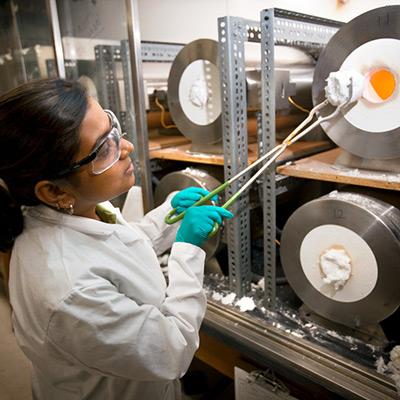As a chemistry major, you’ll learn logical thinking and creative problem solving and can either dive deep following a traditional curriculum or pursue a flexible program that may be ideal for those with alternative career goals. The department’s research areas include inorganic, materials, organic, analytical and physical chemistry, as well as chemical biology.
Requirements
Want to start right away? Here are some basic requirements for students wanting to major in chemistry. Keep in mind this isn’t the complete list of formal requirements — that list can be found on the Courses of Study page.
Earning the chemistry degree involves completing 60 credits of required courses:
- Core courses cover:
- Introductory Chemistry (combined lecture and laboratory),
- Organic Chemistry (lecture and one core laboratory course),
- Inorganic Chemistry (lecture course),
- Physical Chemistry (lecture and one core laboratory course),
- Calculus (lecture), and
- Physics (combined lecture and laboratory);
- Upper-level laboratory courses; and
- Upper-level electives in chemistry, chemical biology, and related areas
Sample classes
- Entrepreneurship in Chemical Enterprise
- Introduction to Quantum Chemistry
- Information Literacy for the Physical Scientist
- Chemistry of Natural Products: Combinatorial Chemistry
Outcomes
All information below is based on the 2022 First-Destination Post-Graduate Survey. Lists are not exhaustive; rather, they are a sampling of the data. If you would like more information, please email as_careers@cornell.edu
What can you do with a degree in Chemistry & Chemical Biology?
Graduate school:
In 2022, 46% of chemistry & chemical biology majors embarked on graduate school journeys. They pursued various advanced degrees, with 64% focusing on their PhD, 20% working towards an MD, 6% dedicated to an MS, and more. Their graduate field interest ranges from chemistry/chemical biology (47%) to medicine (22%) and biochemistry, molecular & cell biology (4%).
These ambitious individuals have chosen to continue their education at prestigious institutions like the University of Oxford, Johns Hopkins University, Harvard University, Stanford University, and Princeton University.
Employment:
43% of chemistry & chemical biology graduates secured employment, and the majority entered sectors in human healthcare services (26%), education (26%), and manufacturing (10%). Meta and Google were the top 2022 employers.
Where 2022 Chemistry & Chemical Biology Graduates Work
| Employer | Job Titles |
|---|---|
| Agency for Science Technology and Research | Research Engineer |
| Beyond Meat | Food Technologist |
| BioMagnetic Solutions | Validation Specialist |
| California Institute of Technology | Research Technician |
| Columbia University | Research Technician |
| Dana-Farber Cancer Institute | Research Technician |
| Ecolectro | Chemist |
| Hycor Biomedical | Research Associate |
| Massachusetts General Hospital | Clinical Research Coordinator |
| Montefiore Medical Center | Clinical Research Coordinator |
| Mount Sinai Medical Center | Associate Researcher |
| National Institute of Health | Assisstant Researcher |
| Tradebe | Field Chemist |
| Underwriters Laboratories LLC | Chemist |
| Weill Cornell Medicine | Lab Technician |
